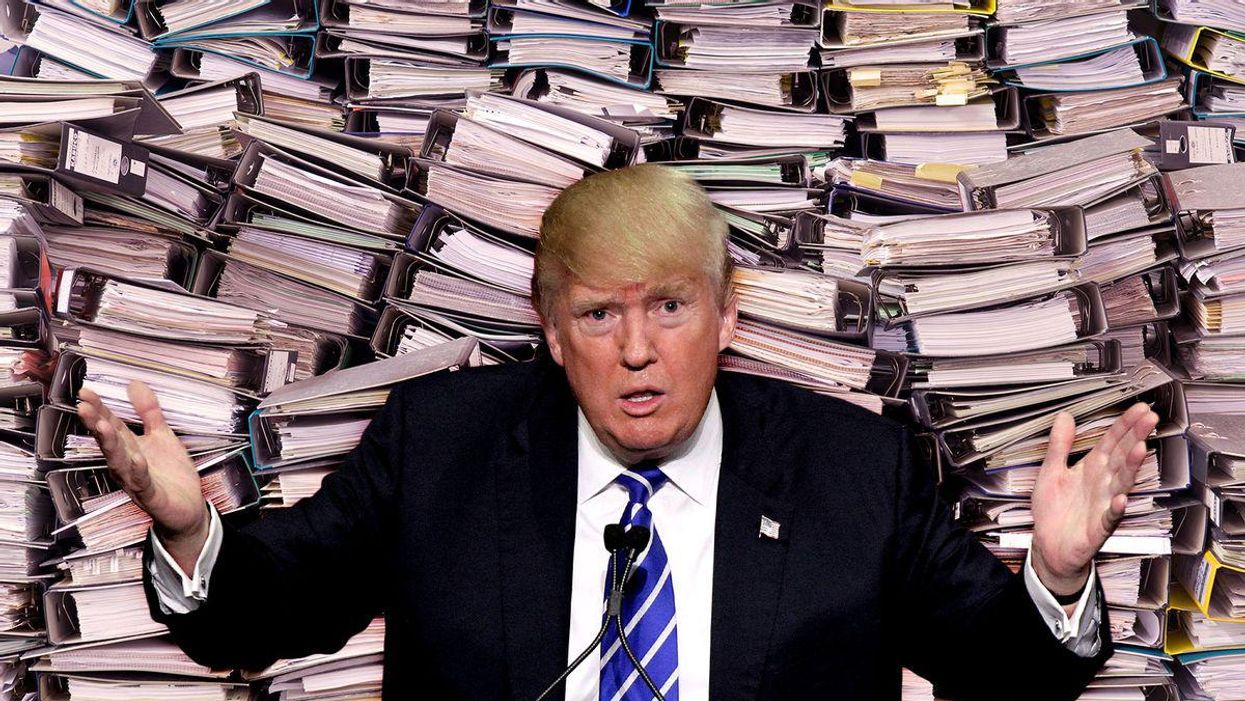How Trump Could Be Prosecuted For White House Document Scandal

In her forthcoming book Confidence Man: The Making of Donald Trump and the Breaking of America, the New York Times’ Maggie Haberman reports that White House staff believed that a clogged toilet in the White House was caused by the former president flushing documents down the commode. This reporting comes not long after the National Archives and Records Administration retrieved 15 boxes of White House documents from Mar-a-Lago — documents that should have been given to NARA when Trump was still in office.
During Trump’s four years as president, he was known for tearing up documents. All of this begs the question: Could Trump be prosecuted for destroying White House records? And according to attorney Chris Truax, the U.S. Department of Justice could, in fact, prosecute the former president — although it wouldn’t be easy.
“Revelations about Donald Trump’s ‘document retention practices’ have come fast and furious over the last two weeks,” Truax explains in an article published by the conservative website The Bulwark on February 14. “First came confirmation from the National Archives that Trump really did habitually tear government records into shreds — a fact which has been reported in the media since 2018. Then came the news that Trump had improperly retained 15 boxes of documents in violation of the Presidential Records Act and shipped them to Mar-a-Lago.”
Truax continues, “Now, there are numerous reports in the press that several of these improperly retained documents were classified. Some of them were supposedly even top secret. And now, the National Archives has referred the situation to the Department of Justice for possible prosecution. Is prosecution a real possibility? Or is this yet another case where Trump’s clearly out-of-bounds behavior either can’t or won’t be prosecuted?”
The attorney goes on to explain that for the Department of Justice, building a case against Trump for destroying White House records would be difficult but not impossible.
“There are problems with prosecuting Trump for mishandling classified documents,” Truax explains. “For example, the Department of Justice would have to demonstrate that Trump himself was responsible for removing the documents — and that he had done so knowing they were classified. Establishing those facts will be hard even if they are true, and these documents were not removed either by accident or at the direction of someone else.”
Truax adds, “Perhaps the biggest problem, though, is that when it comes to classified information, a sitting president really is kind of above the law. While he was president, Trump had the ultimate authority to decide what was classified and what wasn’t. There is at least one documented example of him ‘declassifying’ highly sensitive information on a whim so he could brag about it to the Russians. If he were criminally charged with improperly handling classified documents after he left the presidency, he could always claim that he had declassified those particular documents while he was still president. This would not be a defense to be proud of, but it might also be hard to disprove.”
The Presidential Records Act of 1978, Truax notes, “requires the White House to preserve presidential records and transfer them to the National Archives.”
“Even though Trump has clearly violated both the spirit and the letter of the law,” Truax observes, “he can’t be directly prosecuted under the Act because it doesn’t have criminal penalties. There are, however, other statutes — in particular, 18 U.S.C. § 2071 — that deal with the improper handling of government records and that could form the basis of a prosecution. This statute makes it a felony punishable by three years in prison to willfully and unlawfully conceal, remove, mutilate, obliterate, or destroy a federal record.”
Truax adds, “Applying that to the records that Trump took to Mar-a-Lago might be tricky because in order to commit the crime, you have to know what you are doing is illegal, and you have to know that the records you are removing from federal custody are federal records…. Funnily enough, the activity that puts Donald Trump in the greatest legal danger is also the most absurd: his habit of tearing up documents into little pieces…. Trump was repeatedly warned that tearing up documents was illegal, both by White House Counsel Don McGahn and by his first two chiefs of staff, Reince Priebus and John Kelly.”
According to Truax, the Department of Justice would need to show “intent” if it prosecuted him for tearing up White House documents.
“It’s a flagrant, long-term, habitual violation that Trump knew was wrong even as he continued to engage in it,” Truax writes. “The only possible excuse for his behavior is that he believed that laws like the one he violated were for little people and not for him. Now, it’s up to Merrick Garland to show Trump that he was wrong.”
Reprinted with permission from Alternet
- Investigating Trump's White House Document Scandal, Without Fear ... ›
- Trump Accountants Warn His Financial Data Isn't Reliable - National Memo ›
- National Archives: Trump Took 'Classified National Security' Documents From White House - National Memo ›
- Trump White House Shut Down Record-Keeping On Day Before Capitol Riot - National Memo ›
- Documents Case Judge Refused Advice From Senior Jurists To Step Aside - National Memo ›








